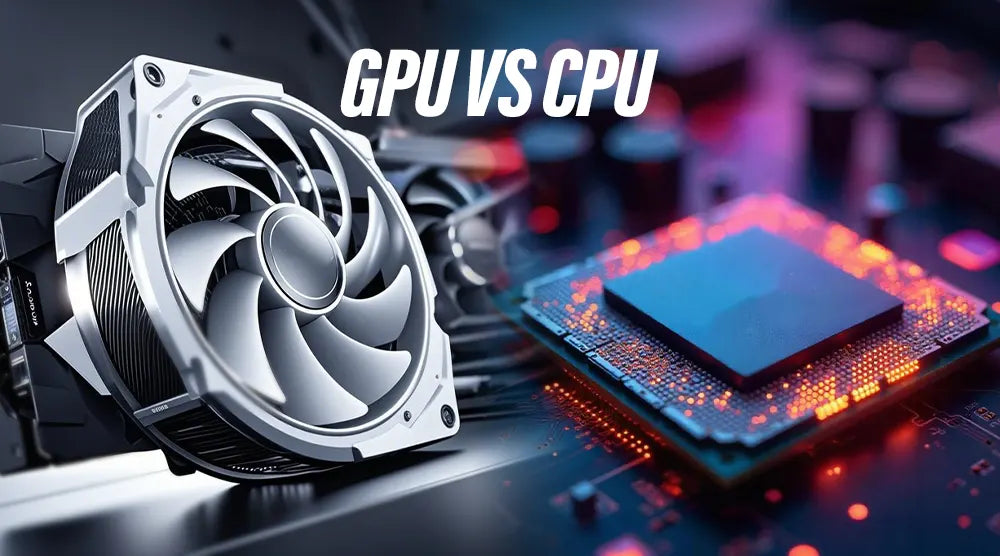In the world of gaming, two acronyms rule the discussions most i.e: GPU and CPU. The GPU vs CPU debate mostly fosters discussions between gamers, fans and ordinary users too.
Both CPU and GPU are important for your system’s performance, but knowing what they do uniquely is crucial for building an ideal PC. Maintaining both components in balanced amounts will make your PC perform well.
This blog explores the functions of GPUs and CPUs to help you determine which one truly enhances your gaming and productivity experience.
What is a CPU?
The Central Processing Unit (CPU) is the brain of your computer, running instructions, calculating, and controlling data flow within your system. The CPU is responsible for many tasks like background processes, game logic, AI calculations, and operating systems.
One of the most crucial considerations is the number of cores and threads your CPU has. A multi-core CPU processes many tasks simultaneously, which makes it more effective at multitasking and heavy load. While gaming, a CPU is charged with the task of processing game logic and AI so that everything will be seamless in the background as an illustration.
Research Insight: The initial CPU, the Intel 4004, was released in 1971 and processed only 4 bits of data at a time, the beginning of computer processing power.
What is a GPU?
On the other hand, the Graphics Processing Unit (GPU) is built for rendering graphics. The GPU speeds up the generation of images in videos, pictures, and real-time graphics.
This part efficiently contributes to delivering high frame rates and high-resolution graphics in video games, producing incredible visual effects and bringing video games to a whole new level.
Advanced games famous today tend to need strong GPUs for mainly a higher resolution. Technologies like ray tracing and classy texture mapping add realism, putting more emphasis on GPU acting in modern gaming.
Research Insight: Recent research shows that dedicated GPUs can outperform integrated graphics by up to 20 times in complex rendering tasks, making them essential for modern gaming.
GPU vs CPU: Performance Breakdown
Gaming
In the GPU vs CPU performance division, the GPU is better at handling games that are graphic-intensive and high-resolution. A high-quality GPU enables a clear boost in frame rates and graphic quality. However, the CPU is still vital for different background functions like handling game AI as well as maintaining smooth performance.
Productivity
The role of each becomes secondary when productivity is your focus. In this scenario, the CPU becomes a main driver, mainly for applications that include multitasking, data processing, and modeling. Spreadsheets, databases, and other productivity software depend greatly on CPU capability.
On the other hand, creatives mostly prefer the GPU for activities like 3D modeling, video editing, and machine learning. In such cases, the capabilities of the GPU enable faster rendering time and smoother playback of heavy graphical material, making it important for professionals.
Tip: Invest in additional RAM along with a top-of-the-range CPU and GPU, as this also contributes to overall system performance, particularly when multitasking.
Bottlenecks
Knowing GPU and CPU bottlenecks is important for anyone building a PC. A bottleneck happens when a component holds another component back, causing inefficiency in your system.
For example: Pairing a high-performance CPU with a low-performance GPU can cause the GPU to struggle, wasting its potential. Make sure the two components match well for your particular to avoid bottlenecks, creating a well-balanced system.
Research Insight: A well-balanced system with CPU and GPU paired to match can achieve performance boosts of 30% or more over systems where a component far outperforms the other.
Choosing Based on Your Needs
Finding the best component for your requirements revolves around your basic use situations.
Gamers
If you consider gaming your top priority, a high-performance GPU is a must-have. But don’t forget about the CPU. A good CPU is also important to avoid stuttering and guarantee a smooth gaming session.
Creators
If you create content or work with software developments, both CPU and GPU are important. The GPU significantly speeds up rendering times, and a powerful GPU manages encoding and multitasking effectively.
Everyday Users
For the casual user, a balance is crucial. Spending too much on one part can result in inactivity. It is better to select the hardware that suits your daily needs without breaking the bank.
In Summary
Understanding the roles of both the CPU and GPU is key to building a system that truly meets your needs.
The GPU delivers stunning visuals and frame rates in games and creative tasks, while the CPU keeps your system running smoothly behind the scenes. The real magic happens when both work in harmony, avoiding bottlenecks and maximizing performance.
If you're unsure how to strike that perfect balance, don’t leave it to guesswork—Technoid Inc. is here to help. From expert advice to building custom PCs tailored to your specific use case, our team ensures every component works together for optimal results.
Contact us today and level up your computing experience with a system designed just for you.
FAQs
1. What is the main difference between a GPU and a CPU?
The CPU handles general tasks and system operations, whereas the GPU handles mainly graphics rendering.
2. Can you play games without a GPU?
Yes, but it will be severely restricted in performance. Integrated graphics in some CPUs can support light gaming.
3. How do I prevent GPU and CPU bottlenecks?
Sync your CPU and GPU capabilities so that they complement one another based on what you use them for to optimize performance.

 United States
United States

